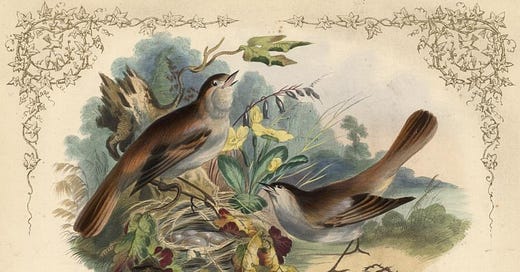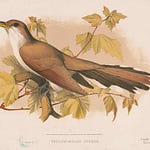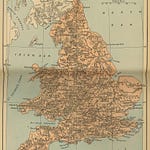Melancholy is our Word of the Week, and our theme, and immediately there leapt to my mind John Keats, whom we featured last week, and who wrote one of his celebrated odes on just this strange and powerful feeling, his “Ode on Melancholy.” But that poem strikes me as too crowded with images and classical references that require explanation, and you don’t exactly come to Word and Song for a scholarly lecture. You come for delight — which is what we aim to provide, while getting in a little instruction on the side! So instead of Keats, I’m turning to Milton today, whose youthful poem Il Penseroso — literally, The Thoughtful or The Pensive — is an exercise in showing that Melancholy is finer than Merriment. I don’t know that I agree with that, but the Preacher certainly did. “The heart of the wise is in the house of mourning,” says that most sober of Biblical sages, “but the heart of fools is in the house of mirth.” Well, that depends; but that’s also another matter.
What I like about the excerpt I’ve chosen is that it reminds me of things that a lot of people have no experience of, not to say that I have much, myself. These are things that chime with the mood of melancholy. Have you ever been outdoors at night, in the fields or the woods, and heard the song of night birds? Milton has. The bird he’s referring to at the beginning of our excerpt is the nightingale, a word whose Old English ancestor meant night-singer.
Of her (it’s actually a him), Milton says, in Paradise Lost, that at night she “tunes sweetest her love-labored song,” and elsewhere, even though night fell, she did not “cease warbling, but tuned all night her soft lay.” The nightingale is a European bird in the summer and a sub-Saharan African bird in the winter. Here in most of the United States, the bird whose beautiful and wildly various song you’ll hear at night will be that of the mockingbird, in spring when the male is establishing his territory. He will sing for a couple of hours at a time, really wearing himself out in song, while another Mr. Mockingbird may be singing a few hundred yards away, in a regular competition of song. I love them — but boy, they can wake you up long before the sun rises! Still, I don’t remember them from my boyhood. The bird I do remember is the whippoorwill, who used to whoop from the birch woods in back of our house, at night; I never saw one, but I heard them all the time, and I have not heard one since.
Then there are the heavens above. In these last few months, I’ve enjoyed looking up at the night sky, walking Molly the dog, and picking out the four planets that have been quite prominent, going from east to west in the sky, Mars, Jupiter, Saturn, and Venus, though now Saturn is below Venus and is usually set before I get outside. Then there’s the Milky Way. Most children in urban areas will not have seen it, ever, because of the city lights that turn the night sky mostly blank. What’s it like? Milton puts it nicely in Paradise Lost, describing the “road” to Heaven, a road “whose dust is gold / And pavement stars, as stars to thee appear / Seen in the galaxy, that Milky Way / That nightly like a circling zone thou seest / Powdered with stars.” Powdered — I like that, and it’s absolutely accurate. You look up and you see powder, countless stars upon stars in that fine belt. Put binoculars on and look, and you will feel that you are at the doorway to another world.
But what if the weather keeps you indoors? Imagine the silence there, of a warm room with a nice fire going in the hearth. Maybe you hear the wind or the rain outside. Certainly you don’t just see the fire or feel its warmth. You can hear it, too. And crickets like the warmth just as well, so maybe the occasional homely chirp of a cricket will please your ear. None of this has a single thing to do with what we call depression, which you’ll often find in those same garish city streets and in the midst of people shouting at each other over the noise of a party. No, this is a kind of sweetness we don’t have enough of, in a silence that is just next door to song.
Sweet bird that shunn'st the noise of folly, Most musical, most melancholy! Thee, chauntress, oft the woods among, I woo to hear thy even-song; And missing thee, I walk unseen On the dry smooth-shaven green, To behold the wandering Moon, Riding near her highest noon, Like one that had been led astray Through the heavens' wide pathless way; And oft, as if her head she bowed, Stooping through a fleecy cloud. Oft on a plat of rising ground, I hear the far-off curfew sound, Over some wide-watered shore, Swinging slow with sullen roar; Or if the air will not permit, Some still removed place will fit, Where glowing embers through the room Teach light to counterfeit a gloom, Far from all resort of mirth, Save the cricket on the hearth, Or the bellman's drowsy charm, To bless the doors from nightly harm.
Listen to this episode with a 7-day free trial
Subscribe to Word & Song by Anthony Esolen to listen to this post and get 7 days of free access to the full post archives.













